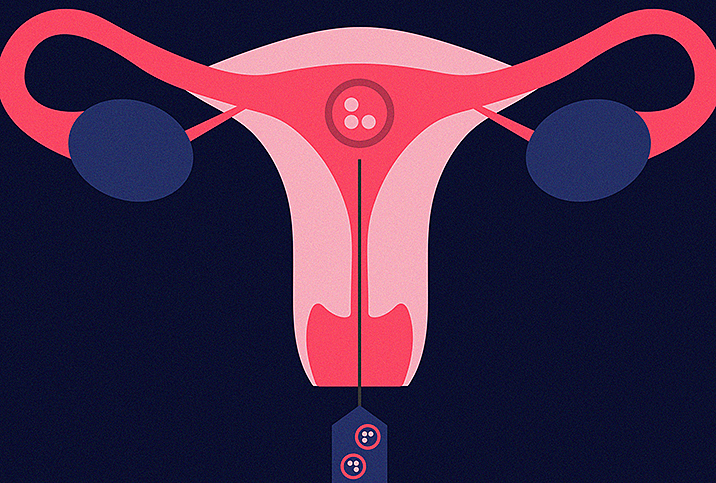Coping With Women's Infertility

About 9 percent of men and about 11 percent of women of reproductive age in the United States have experienced fertility problems. While the root causes of infertility are typically physical, a diagnosis can take an emotional and mental toll on couples and may feel just as damaging as a diagnosis for a serious illness. Some couples may even feel as though they're dealing with the emotional impact of sudden loss and grief.
Many options are available to treat infertility, but treatment can often lead to even more stress, both psychologically and financially. Understanding where these feelings come from, working through them with the help of a professional and knowing which options are available to you—both for infertility and mental health—can help make coping with your situation more manageable.
An overview of women's fertility
The fertility of a woman is defined as the ability to conceive a child during the process of ovulation. Women become fertile in their teenage years at the same time their menstrual cycle first occurs. For most women, peak fertility—the years in which they are most likely to conceive a child—is from the late teens into the 20s. By age 30, a woman's ability to get pregnant starts to decline, with the decline really becoming significant starting at 35. Generally speaking, 45 is the age at which women are no longer likely to get pregnant naturally.
Women who are trying to get pregnant can keep track of their ovulation cycle, which happens about halfway through the menstrual cycle. The five days leading up to ovulation and that day—when the egg is released from the ovaries—are the only days in the cycle during which a woman can get pregnant; a woman is most fertile during the three days leading up to and including ovulation.
Sperm can also live in the body for five to seven days after you have sex, which means that in cases where you ovulate early, it is technically possible to get pregnant after your period, though it is unlikely.
If you've been trying to get pregnant without success, you may start to wonder if you or your partner is infertile. On average, doctors recommend trying for at least a year before you worry about your fertility. If you're older than 35, however, you may want to check with your doctor after six months of trying.
After a year has passed and you still haven't been able to conceive, check with your doctor to undergo tests to see whether you are fertile. If the results indicate you are infertile, don't worry—there are still options available to help restore your fertility. Infertility is a complex issue with many causes and variables, so be sure to have a conversation with your doctor if you are considering treatment. Most insurance companies do not cover infertility testing or treatment, so be prepared for that.
Emotional impacts
The process of having a child is a long and difficult one, often causing a series of intense emotions to flare up. Those emotions can include fear, anger, resentment, jealousy, frustration, grief and shame, just to name a few. If these emotions aren't dealt with in a healthy manner, they can affect both you and your partner.
Many of these emotions arise from the social stigma and expectations surrounding marriage and children. Most people assume that the next step after getting married is to settle down, buy a house and raise a family, but for some couples, that simply isn't possible—at least, not biologically. Emotions are complex and, at times, difficult to understand, especially for people viewing the situation from the outside. They might ask too many questions or too few. They might be overbearing or increasingly distant. Whether or not it's well-intentioned, the behavior change can pile on to an already difficult situation.
Alongside this, many women experience infertility depression. This condition is often accompanied by apathy, insomnia, the inability to focus and increased anxiety. Frequently, women with infertility depression may turn to alcohol or drugs more frequently, isolate themselves, feel guilty or worthless, experience sudden changes in appetite or have thoughts of suicide in extreme cases.
As with any form of depression, speaking with a mental health professional can be a beneficial coping technique. Many mental health professionals are versed in dealing with infertility and the emotions that accompany it, so if you're considering seeking therapy, look for a counselor who specializes in managing infertility. While looking for a therapist can be a stressful endeavor in itself, therapy may benefit your mental health.
An infertility diagnosis is a difficult situation for anyone to handle, but always remember that you are not alone. Infertility also doesn't mean that starting a family is impossible.
Alternative options
While biological conception may not be an option, fortunately, alternative options can help you start a family.
A common approach to handling infertility involves assisted reproductive technology (ART) such as in vitro fertilization (IVF). IVF is regularly referred to as having a "test-tube baby," but what does that mean? During IVF procedures, multiple mature eggs are retrieved from a healthy female and fertilized by sperm in a petri dish in a lab. Three to five days after fertilization, the blastocyst is ready for either implantation into the uterus or freezing for a later cycle.
The fertilized egg is then implanted in the woman's uterus after a few days of fertilization. Three to five days after fertilization, the blastocyst is ready for either implantation into the uterus or freezing for a later cycle.
Alternatively, couples might consider intrauterine insemination (IUI), which is otherwise known as artificial insemination. IUI involves inserting sperm into the womb with a thin plastic tube through the cervix. Ideally, IUI results in normal pregnancy and can be coordinated with a normal cycle and fertility medications.
Depending on the cause of infertility and whether it lies with you or your partner, you might want to consider a donor for either sperm or an egg. A donor still allows the genetic makeup of either you or your partner to be a part of the process while ensuring that conception is a possibility. Couples looking to have children through this process should vet potential donors to make sure they are living a healthy lifestyle suited for reproduction, or creating healthy sperm/eggs.
Adoption is another option for couples faced with infertility. There are many reasons to seek adoption, but primarily because it allows couples who are either infertile or in a same-sex relationship to experience the joys of parenthood.
Help is out there
Despite the difficulties you're facing with an infertility diagnosis, knowing that help is out there can ease some of the pain, pressure and feelings of hopelessness that you may be experiencing. Whether you need support to deal with new emotions or a neutral observer to listen to your concerns, many options are available to aid the healing process.
A support group can offer solace as you connect with others who are experiencing similarly difficult times. Speaking with a licensed mental health professional can help you navigate the turbulent emotions of grief and develop coping mechanisms that work best for you.
Several online resources can provide valuable information and help to anyone considering alternative options, whether it's adoption, surgery or medical intervention. Some of those resources:
- RESOLVE is a national infertility support organization with links to support groups and information on dealing with infertility.
- Choice Moms is an organization that supports single women who are trying to be mothers. Resources on conception and adoption can guide you through the process.
- Parents Via Egg Donation provides information about all facets of the egg donation process.
- Livestrong Fertility is an initiative dedicated to providing information, support and hope to cancer patients and survivors whose treatment plans may increase their risk of infertility.
Remember that no matter how alone you may feel, you are not. Infertility is not an uncommon issue. It's one that many couples face. It's normal, natural and acceptable to experience feelings of depression, grief and shame. The importance of processing these feelings in a healthy manner and establishing coping mechanisms suited to you and your situation are of utmost importance. Don't be afraid to reach out for help during this tumultuous time.
If you're considering alternative treatment options, speak to your doctor about which ones will work best for you. Get in touch with a mental health professional who can give you tools to help move past any negative feelings. Help may be closer than you think..


















